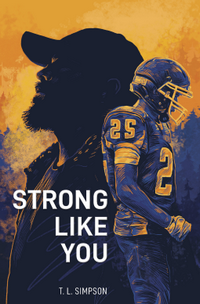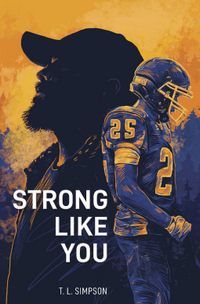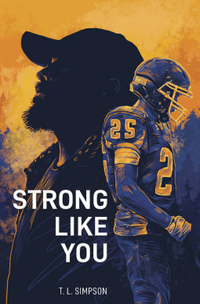 Strong Like You
Strong Like You
DETAILS: Publisher: Flux Publication Date: March 12, 2024 Format: eARC Length: 224 Read Date: March 1, 2024

What’s Strong Like You About?
Walker Lauderdale is a high school sophomore and a starter for his small Arkansas high school’s football team. He and his cousin/best friend/might as well be brother Sawyer are fierce players for the defense (and we see that almost instantly). This should be the best time in his young life—but there’s something wrong.
His dad has been missing for a month. He’s not there to watch his first game. He’s not there to burst with pride, to offer advice, or to cheer from the stands. He’s just…gone. Walker’s dad and Sawyer’s dad (also best friends and teammates on the same high school team before marrying sisters) took off one night and haven’t returned. The two boys are certain they’ll be back any time—they’re frequently checking the bleachers to see their fathers up there.
The book is an extended monologue—or a series of them. Technically, an apostrophe, but let’s stick with monologue. Walker is addressing his father—catching him up on the turmoil and victories he’s missing, the hurt Walker feels because of his absence, and how he’s trying to make things work until his dad comes back. The grief, loss, and anger jump off the page.
Walker’s dad isn’t a great one, either, it should be stressed. Rarely employed, his income is largely illegal and irregular. Both missing fathers are abusive to their wives and sons. But in the way that we all can recognize, the boys are just that much more devoted to them because of it—making their dads proud is a chief aim of theirs.
Walker becomes determined to go look for his dad—which involves starting with the man his dad and uncle were last seen with—a truly frightening and violent man. Sawyer tries to dissuade him, but that just makes Walker even more certain that he needs to act.
But does he truly want to find the answers he’s seeking?
Learning About Guns
Walker—like so many people in the U.S.—appreciates guns. He’s quick to grab a pellet gun to (try to) chase away his uncle. But his cousin Sawyer? Sawyer is a nut for guns, he has magazines about them all over his room. At some point, Sawyer comes across a pistol (and somehow gets money for many bullets for it—or at least acquires them). There’s a big difference between a pellet gun and a Colt 1911, and it doesn’t take long for Walker to start learning about them.
Not what you learn in video games/TV, not what Sawyer’s survival mags teach, or anything like that. But about the reality of them—how they can invite violence, how holding one affects you, what destruction they can bring even without trying. There’s no pro-/anti- gun message at work here. No lessons or sermons were delivered. But the reality of what a gun can do to a person, a situation, or an attitude is presented in stark reality. I’d say it’s easily one of the best things about this book, but if I started listing the best things about this book, we’d be here for a long time.
Anger
Walker and Sawyer are angry young men—it’s simmering right below the surface, and comes out at inopportune times. Although, it does sometimes come out when it should*—and we see an example of that in the opening minutes of their first game of the year.
* Arguably, anyway. Their coach and teammates would say it’s appropriate.
There are plenty of reasons for them to be so angry—even before their fathers abandoned them. The more time you spend with them—Walker in particular—you see just how many reasons he has. It’s part of what his parents have passed down to him, part of the example they’ve set and the environment he’s been raised in.
The guy his father and uncle runs with, Lukas Fisher, has another kind of anger inside him—and he doesn’t hesitate to express it—where Walker’s parents shape him by their anger, Lukas “trains” his pit bull with his.* While we can see a little constructive use of anger, we can see some people who are angry due to circumstance and situations—but Lukas? He seems to revel in it, maybe even feeds on anger.
* This is off-point, but Simpson’s description of the dog’s barking was both wonderfully accurate and a bit of a tension breaker.
But back to Walker, it’s his anger that lands him in weekly sessions with the school counselor before the book begins. This counselor is one of the few who seem to look beyond Walker’s attitude, his anger, his disinterest in education, and his abilities on the football field. It’s unclear how Walker will respond to him—or even if he can respond to this man appropriately. But it’s a rare example of how his anger just might put him in the right place.
The Meaning of Manhood/Strength
Walker’s primary concern at the beginning of the book is to be strong—strong, as the title says, like his dad. For him, strength equals control. Control over your life, your circumstances, your choices—it’s also tied into how to fix things. How to make things better.
Yes, it absolutely is about physical strength first and foremost, but it’s about more than that, too. For a character presented as not that intelligent (Walker would say worse than that about himself), he’s really perceptive. He’s spent more time than many—probably even he—realizes thinking about the nature of strength.
Ultimately, this is what being a man is for Walker (and Sawyer, too)—maybe even Hank and Rufus, too. Walker sees Hank as strong—physically, emotionally, and mentally. This is what he aspires to—for himself, for his mother, and possibly even for Hank. If Walker gets to be strong enough—on and off the football field—he can make Hank and his mom proud. He can make their lives better, fixing those things that need fixing (that his father never gets around to fixing, despite Walker’s deep-seated conviction that he could and will).
Over the course of this book, this understanding of what manhood means and what strength means are seen in light of that anger mentioned above. One of the bigger questions of the novel surrounds Walker and Sawyer—as they navigate toward adulthood/maturity, what will win out? Strength or anger? What kind of men will they be?
The Love Story
Okay…after a few attempts, I realize that I cannot say anything about this without a spoiler. All I will say is that it’s perfectly conceived, perfectly executed, and just what this book needed it to be.
So, what did I think about Strong Like You?
I have several more things I wanted to talk about—but this is too long, and almost two days behind schedule (it’s at least 6 hours after I normally post something). What’s worse, every time I start writing “just one more thing,” I think of two more. So I’m bringing this in for a landing, and I may bounce around a little bit here.
I do not even like football—why do I keep reading books featuring it? Okay, I live in the USA and it’s pretty hard to escape, that’s a large part of it, but still… There’s a large part of me that doesn’t care as long as it’s a book like this one. And sure, he’s talking about a different game entirely, but Walker would agree with Dani Rojas—”Football is life!” He thinks in football terms and metaphors, he can’t explain to someone why he loves football—he can’t even understand why that person doesn’t like football, it’s like telling him that they don’t like to breathe. Most of the time, Simpson doesn’t have Walker or Sawyer tell us this, they just live this. The way he does this alone tells me that Simpson is someone to watch (or, I suppose, he thinks the same way as Walker does and it’s coming out organically—but I don’t think so)
I really should spend a lot of time talking about Walker’s guidance counselor and the arc of their relationship, there’s so much about Simpson’s work here that should be commended. There’s also this strange little tangent featuring a recent graduate of Walker’s high school and his little sisters that tells us more about Walker than anything except his attitude toward football—who he really is, not who he thinks he needs to be.
You don’t have to read very far before you know a couple of things—1. despite his conviction—or at least the conviction he voices—things are not going to go the way he anticipates, and that rough times are ahead for Walker; and 2. you are not going to want to put this book down until you reach the last page. I glanced at the first couple of pages to make sure it downloaded correctly and had to walk away from my Kindle, because I had multiple other deadlines and I knew if I didn’t do that, I’d finish the book before I did anything else. I can’t describe it, but there’s something about Walker’s voice, the way he’s talking to that father that isn’t there that just grabs you.
I’m not entirely satisfied with the way the novel ended. I liked the resolution to the various stories, let me be clear. But I feel like I could see Simpson’s not-so-Invisible Hand working to get some of the resolutions to work out the way they did. I like the way the storylines ended up, so I’m not going to complain too much. And since it was only in the closing pages that I thought about maybe criticizing something in the book, Simpson earned a little authorial heavy-handedness.
This is a real winner—Strong Like You shares so much DNA with Eli Cranor’s Don’t Know Tough (but is not a copy in any way) and even hearkens back to Early Autumn by Robert B. Parker. And anytime a book can make me compare it favorably with those two knockouts, I’m going to put it down as pure joy.
If you’re someone who gets hung up on the YA tag, push “Pause” on that for 224 pages. This is a book that deserves a fair shake and many, many readers—Simpson’s debut is as strong as Walker hopes to be.
Disclaimer: I received a copy of this book from North Star Editions via NetGalley—thanks to both for this.

This post contains an affiliate link. If you purchase from it, I will get a small commission at no additional cost to you. As always, the opinions expressed are my own.
![]()




